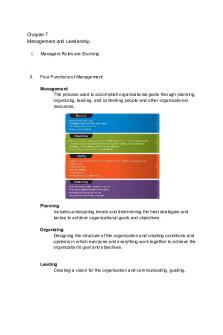Chapter 7 Inquizitive PDF

| Title | Chapter 7 Inquizitive |
|---|---|
| Author | jenny oster |
| Course | Psychology |
| Institution | Sam Houston State University |
| Pages | 3 |
| File Size | 92 KB |
| File Type | |
| Total Downloads | 70 |
| Total Views | 149 |
Summary
Chapter 7 Inquizitive...
Description
Chapter 7 - Memory
Encoding – taking the information we perceive and converting it for storage
Memory – the ability to acquire, retain, and retrieve information
Storage – retention of information in the brain for later use
Retrieval – accessing information stored in the brain
Reconsolidation does not delete memories; instead, it updates them
Although encoding failure results in poor long-term reacll, it is more likely to be a failure of attention than a failure of long-term memory itself o Someone who is distracted and fails to encode information can’t really be accused of “forgetting,” because without encoding information in the first place, there’s nothing in long-term memory to retrieve.
Some nonhuman species have been found to solve problems using episodic memory
o birds are able to return to locations in which they previously stored food, suggesting they may remember having done so.
Free Recall o Reciting a poem from memory on the spur of the moment - We can recall complex and lengthy pieces of information without relying on cues.
Cued Recall o Answering multiple-choice questions - By supplying answer options, multiple-choice questions always provide some sort of cue that can facilitate recall.
o Naming 10 people from grade school without looking at a yearbook - Naming people we went to school with is harder without some sort of cue.
Retrieval is the active process of drawing a memory to consciousness
sensation
encoding
storage
retrieval
Semantic memory – involves general knowledge and facts o Reciting movie dialog you know by heart o Repeating driving directions to a restaurant over the phone o Explaining the rules of playing a card game
Whether or not accurate recall has high stakes doesn’t change the fact that memory is imperfect and subject to distortion.
Effective for Long term memory Ineffective for long term memory - Go to bed at a reasonable - Transition directly from one hour (critical to memory learning topic to the next consolidation) (Rapidly switching between topics without - Mix visual learning with breaks can result in auditory learning (Learning in multiple sensory modalities helps to ensure that information is more deeply encoded) - Take short breaks during work and long breaks on your days off (Reducing stress helps to improve memory, and so does spacing learning outz)
Proactive Interference - Erin took four years of French in high school. On
2
learning interference by undermining consolidation.)
Retroactive Interference - Retroactive interference occurs when newer
her first exam in her college Italian course, she can only recall the French words. (Proactive interference occurs when older memories block retrieval of newer memories. In this case, the old language has blocked the new language) -
3
memories block retrieval of older memories. In this case, the new password has blocked the old password....
Similar Free PDFs

Chapter 7 Inquizitive
- 3 Pages

Inquizitive 1
- 6 Pages

Chapter 7 quiz#7
- 3 Pages

Assignment #7 Chapter 7
- 2 Pages

Chapter-7
- 7 Pages

Chapter 7
- 4 Pages

Chapter 7
- 57 Pages

Chapter 7
- 46 Pages

Chapter 7
- 7 Pages

Chapter 7
- 1 Pages

Chapter 7
- 5 Pages

Chapter 7
- 8 Pages

Chapter 7
- 34 Pages

Chapter 7
- 10 Pages

Chapter 7
- 10 Pages

Chapter 7
- 32 Pages
Popular Institutions
- Tinajero National High School - Annex
- Politeknik Caltex Riau
- Yokohama City University
- SGT University
- University of Al-Qadisiyah
- Divine Word College of Vigan
- Techniek College Rotterdam
- Universidade de Santiago
- Universiti Teknologi MARA Cawangan Johor Kampus Pasir Gudang
- Poltekkes Kemenkes Yogyakarta
- Baguio City National High School
- Colegio san marcos
- preparatoria uno
- Centro de Bachillerato Tecnológico Industrial y de Servicios No. 107
- Dalian Maritime University
- Quang Trung Secondary School
- Colegio Tecnológico en Informática
- Corporación Regional de Educación Superior
- Grupo CEDVA
- Dar Al Uloom University
- Centro de Estudios Preuniversitarios de la Universidad Nacional de Ingeniería
- 上智大学
- Aakash International School, Nuna Majara
- San Felipe Neri Catholic School
- Kang Chiao International School - New Taipei City
- Misamis Occidental National High School
- Institución Educativa Escuela Normal Juan Ladrilleros
- Kolehiyo ng Pantukan
- Batanes State College
- Instituto Continental
- Sekolah Menengah Kejuruan Kesehatan Kaltara (Tarakan)
- Colegio de La Inmaculada Concepcion - Cebu